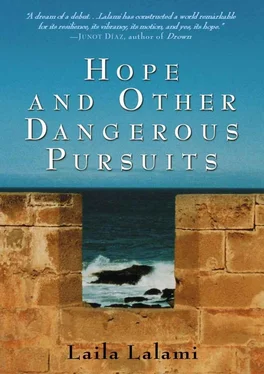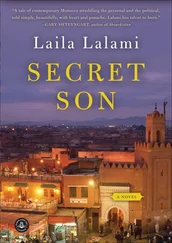“Have you been to the doctor?” Halima asked.
“What for?”
“For your arthritis.”
Fatiha grumbled something about having already gone to enough doctors.
“You should go again. These days, they probably have better medication.”
“I don’t need medication. I’ll be fine,” Fatiha said, her voice trembling. “Besides, why should I worry about myself when my own daughter doesn’t care enough about me to let me have a little blessing?”
Halima shook her head. Her mother’s knack for melodrama was something she’d never get used to. She could never get used to people who wanted others to help them out of their problems instead of relying on themselves. She picked up the first beghrir and set it on the tray, then ladled more dough.
“We all care about you, Mmi,” Halima said. “Here, have a taste.”
Fatiha rolled up the beghrir and took a bite. “God, this is delicious.”
“I’ll take you to the doctor myself.”
“I don’t have the money to go to the doctor’s.”
“Don’t worry. I’ll pay,” said Halima. She reached out and touched her mother’s arm as if to comfort her. Then she turned to watch the beghrir break into bubbles as it cooked. She did not notice the fading afternoon light that lengthened the shadows behind her, framing her body like the arches of a shrine.
THE TEENAGER WAS Faten’s favorite client. He wasn’t what you would call a regular, like her Friday-night or first-of-the-month men, those who came to her the way they might stop by a bakery and buy an extra pastry to go with their coffee because they’d just gotten paid. In the five months that she’d known him, there hadn’t been a regular pattern to his visits, but whenever she saw his car coming up Calle Lucia, she’d arch her back, cock her hip, and smile. He always got out of the car, too, which is more than you could say for the others, the men who talked to her while they bent over their steering wheels, as if spending more than a minute deciding who they were going to fuck was too much of an imposition on their time. He was different.
His name was Martín. At first she’d assumed it was just a fake name, but someone had called his mobile phone once, right after he’d paid her, and she’d heard a hoarse voice at the other end of the line yelling the name. It sounded like a cop — someone with authority, someone used to giving orders. Later on, she asked Martín who it was and he said it was his father, calling from Barcelona to ask why he was out so late, as if Martín were still a child. Martín explained that he was the youngest of his father’s children from two marriages. He shook his head and put his phone away, grumbling that el viejo was losing it.
She did not know Martín’s last name. What she did know was that he had recently moved to Madrid to attend Universidad Complutense. He never talked about what he studied, and she didn’t ask, for she feared it would bring back memories of her own college life back in Morocco and she didn’t want to think of that time in her life, when the world still seemed full of promise and possibility.
In a way, Faten liked never knowing when he’d stop by. It gave her something to look forward to, and if he showed up, it was like a gift, something she could unwrap and hold up to admire. The later it got, the better the surprise. And there was, too, the possibility that if he came up to see her late in the night he could be her last one, so it didn’t matter how long she stayed with him. That kept her going on bad nights, when it rained or when the girls bickered. The Spanish girls often fought with the Moroccans or Romanians or Ukrainians, but it was a useless battle. Every week there was a new immigrant girl on the block.
Martín reminded her of a neighbor she’d had a crush on when she was little. At that time she had been sent to live in Agadir with her aunt because her mother couldn’t afford to keep her in Rabat, what with her father having left them and the child support the court had ordered him to pay never having materialized. Faten had stayed in the seaside town until she turned fourteen and her breasts grew into a D cup. The single man next door had started coming around on the silliest of excuses, asking to borrow a cup of sugar or a glass of oil. That was when Faten’s aunt decided it was time for her to go back to the capital.
Faten had moved in with her mother in the Douar Lhajja slum, the kind of place where couscous pots were used as satellite dishes. She’d stayed there for six years — and in that short time she had managed to graduate high school, go to college, find God, and join the Islamic Student Organization. She’d had the misfortune of making a derogatory comment about King Hassan within earshot of a snitch but had, rather miraculously, escaped arrest, thanks to a friendly tip. So when her imam suggested she leave the country, she had not argued with him. She had done as she was told. Except her imam wasn’t there when the Spanish coast guard caught her and the other illegal immigrants, nor was he around when she had to fend for herself in Spain. Now no one could decide for her whether or not she could see Martín.
Tonight had been good. She’d made good money and Martín was her last client. She climbed into his car and pulled down the passenger-side mirror, dabbing her face dry with a Kleenex and reapplying her lipstick. She glanced at him. His light brown hair was falling out prematurely, and his thin lips grew thinner whenever he was emotional. He wore a pair of dark slacks and a loose button-down shirt, where gold arabesque letters danced on a sea of deep red. She asked what he wanted to do.
“Just talk,” he said. “Can we?”
“Como que no,” she said.
He started the car and drove slowly off Calle Lucia, toward Huertas. Faten let her head rest against the seat and stretched her legs, her feet painful from standing too long in high heels. It had been just as hard to get used to the heels as to the short skirts. Before this, back at home, it was always flats or sneakers, an ankle-length skirt, and a secondhand sweater.
“So, where are you from?” he asked.
“Rabat.”
“I thought you were from Casablanca.”
“I can be from Casablanca if you want.” She laughed, wanting him to know it was just a line, not something she’d actually tell him with seriousness. She wanted him to know that she thought he was different.
He turned up a side street and stopped the car. She was quiet, watching the lights from the bars up the street, trying to figure out where they were with respect to Lavapiés, where she lived. She spent a lot of time on the street, yet she didn’t know Madrid well at all. Since she’d arrived here, she hadn’t seen much — only the streets, her apartment, the hospital, and the stores.
Martín spoke softly. “How long have you been in Madrid?”
“Three years, just about.”
“I bet you have a lot of regulars.”
“A few. Not a lot.”
“They don’t know what they’re missing.”
“And what would that be?”
He circled the knob of her knee with his thumb. “So much,” he said. “I like the smell of your skin — salty like black olives.” He coiled a strand of her hair around his finger, let it spring out, ran his fingers along her cheekbones, cupped her right breast. “And your breasts — ripe like mangoes.”
“You’re making me sound like a dish,” she said.
“I guess you could say I’m a connoisseur.”
She looked into his eyes, and for the first time she wondered if what she had assumed was a flicker of innocence was something else — a twinkle of playfulness, even mischief. “There’s something I’ve been meaning to ask,” she said. “About your father. Is he a cop?”
Читать дальше












